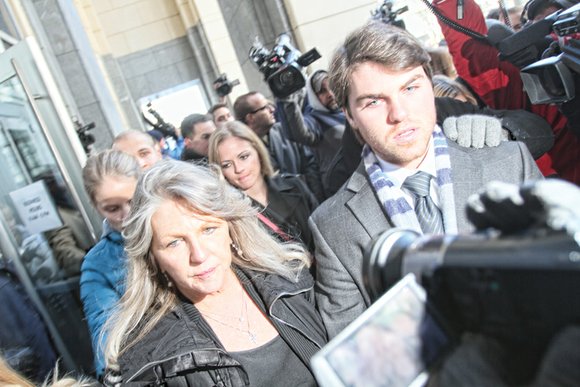Former Va. first lady sentenced to prison
Joey Matthews | 2/26/2015, 2:24 p.m.

Former Virginia First Lady Maureen McDonnell broke a two-year silence on her role in the federal corruption case that rocked Virginia and sent shockwaves across the nation.
Fighting back tears, she read from a prepared statement during her sentencing hearing last Friday before U.S. District Judge James R. Spencer.
“I am the one who opened the door, and I blame no one but myself,” she said, acknowledging that she was responsible for bringing former Star Scientific CEO Jonnie Williams, whom Judge Spencer had called “a serpent,” into the Execu- tive Mansion.
“And the venom from that snake has poisoned my marriage, has poisoned my family and has poisoned the common- wealth that I love,” she said. “I would give anything to turn back the clock and live these events over with the knowledge I now have.”
The relationship Mrs. McDonnell and her husband, former Gov. Bob McDonnell, had with Mr. Williams ultimately proved the couple’s undoing.
They were convicted in September on federal corruption charges for taking more than $177,000 in gifts and loans from Mr. Williams in exchange for giving him access to state officials to promote his company’s dietary supplement.
Mr. McDonnell was convicted on 11 counts and sentenced in early January to two years in federal prison followed by two years’ probation.
Mrs. McDonnell was convicted on nine felony counts, which later were reduced to eight.
Concluding the more than three-hour hearing that was punctuated by the testimony of eight character witnesses, including the McDonnells’ daughter Rachel, Judge Spencer sentenced Mrs. McDonnell to one year and one day in federal prison.
The additional day allows her to reduce her prison time by up to 15 percent — or 54 days — for good behavior.
He also ruled the former first lady could remain free on bond pending the outcome of her appeal of her conviction.
While Mr. McDonnell had been scheduled to report to prison by Feb. 9, the 4th U.S. Circuit Court of Appeals ruled that he could remain free on bond during his appeal.
Arguments in his appeal are scheduled for May 12 before a three-judge panel. Legal briefs are due March 2.
Judge Spencer spoke for about five minutes before rendering Mrs. McDonnell’s sentence in a packed courtroom.
He called the case “sad, tragic and puzzling.”
He spoke of the “good Maureen and the other Maureen.”
He said he had been swayed by scores of letters and character witnesses that Mrs. McDonnell had done a lot of good in her life, but said he felt compelled to give her prison time because he had sentenced her husband to serve time.
She is the first former first lady of Virginia to be convicted of a felony and sentenced to prison.
The McDonnells exchanged a brief hug following her sentencing, then spent the rest of their time separately hugging other family and friends.
Mrs. McDonnell’s attorneys thanked Judge Spencer afterward for his mercy in sentencing her well below recommended federal guidelines.
“We still believe in Maureen’s innocence, and we intend to seek her complete vindication,” Randy Singer, one of her attorneys, said.
During the testimony, one of the most passionate pleas for leniency came from Lisa Thomas, who runs a prisoner re-entry program for women in Fredericksburg. She said she would employ Mrs. McDonnell in the program if she were sentenced to community service.
Ms. Thomas said she had been hooked on crack cocaine for eight years before being arrested and is now celebrating 30 years of sobriety. She said she first met Mrs. McDonnell when the two were preparing to speak at an event.
She said Mrs. McDonnell was going through tremendous personal pain during her final years as first lady. Her parents had died, a sister had cancer, and she had become an empty nester and was going through menopause.
“Wouldn’t you lose your temper once in a while, too?” Ms. Thomas asked, referencing Mrs. McDonnell’s reputation as a hothead in the Executive Mansion.
Through it all, she said, Mrs. McDon- nell continued to advocate as first lady for military families and other initiatives supported by the FLITE program, an acronym for First Lady’s Initiatives Team Effort.
Rachel McDonnell testified that her mother “feels like she’s lost everything and she’s isolated herself.
“I know she’s a strong woman,” she added. “But I don’t know how much more she can handle.”
In closing arguments before Judge Spencer, one of Mrs. McDonnell’s attorneys, William Burck, portrayed her as a woman overwhelmed by the demands of being first lady, who often felt alone and abandoned by her husband, a fast-rising political star. He said she was afforded little privacy, hated public speaking engagements and would often lose her temper as she prepared for talks.
Prosecutor Jessica D. Aber scoffed at the notion that Mrs. McDonnell was deprived of anything. She said most defendants appearing in court have little family support, lack butlers and chefs like those at the Executive Mansion and often wonder where they would be living from week to week.
Ms. Aber called Mrs. McDonnell’s deeds a “crime of opportunistic greed.”
Speaking to supporters before he left the courthouse without his wife, Mr. McDonnell said, “We have done nothing wrong and I believe in the Lord for vindication.”
He then told a Free Press reporter before stepping outside into a sea of waiting reporters and cameras, “I appreciate Judge Spencer’s mercy, and we’re looking forward to pursuing the appeals.”
Mrs. McDonnell did not acknowledge several Free Press requests for comment before she hurriedly left the courtroom with her son, Bobby, followed by about 100 media members. The pair rushed into a waiting SUV.
Mrs. McDonnell’s defense team was to file her appeal this week.
If the McDonnells’ appeals are denied, they could seek reviews from the U.S. Supreme Court, a process that some legal analysts have said could last for years.






